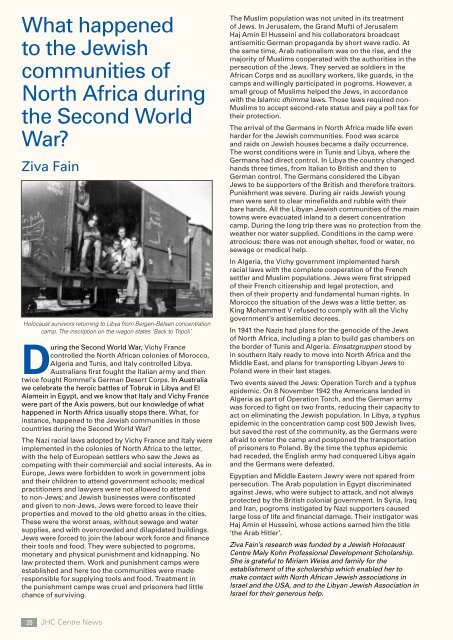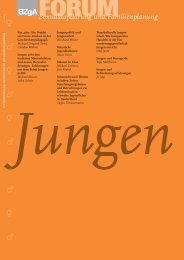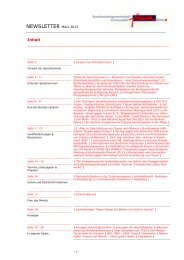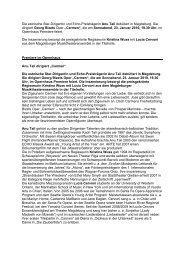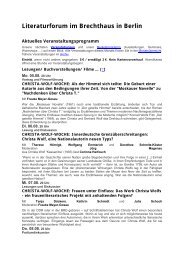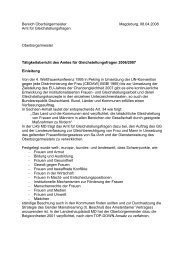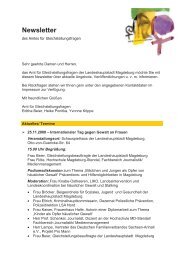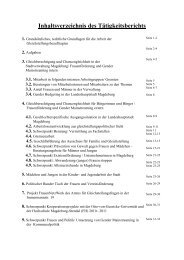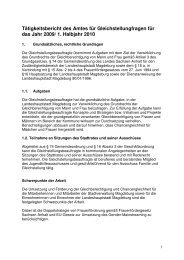Raoul Wallenberg becomes Australia's first honorary citizen
Raoul Wallenberg becomes Australia's first honorary citizen
Raoul Wallenberg becomes Australia's first honorary citizen
Create successful ePaper yourself
Turn your PDF publications into a flip-book with our unique Google optimized e-Paper software.
What happened<br />
to the Jewish<br />
communities of<br />
North Africa during<br />
the Second World<br />
War?<br />
Ziva Fain<br />
Holocaust survivors returning to Libya from Bergen-Belsen concentration<br />
camp. The inscription on the wagon states ‘Back to Tripoli’.<br />
During the Second World War, Vichy France<br />
controlled the North African colonies of Morocco,<br />
Algeria and Tunis, and Italy controlled Libya.<br />
Australians <strong>first</strong> fought the Italian army and then<br />
twice fought Rommel’s German Desert Corps. In Australia<br />
we celebrate the heroic battles of Tobruk in Libya and El<br />
Alamein in Egypt, and we know that Italy and Vichy France<br />
were part of the Axis powers, but our knowledge of what<br />
happened in North Africa usually stops there. What, for<br />
instance, happened to the Jewish communities in those<br />
countries during the Second World War?<br />
The Nazi racial laws adopted by Vichy France and Italy were<br />
implemented in the colonies of North Africa to the letter,<br />
with the help of European settlers who saw the Jews as<br />
competing with their commercial and social interests. As in<br />
Europe, Jews were forbidden to work in government jobs<br />
and their children to attend government schools; medical<br />
practitioners and lawyers were not allowed to attend<br />
to non-Jews; and Jewish businesses were confiscated<br />
and given to non-Jews. Jews were forced to leave their<br />
properties and moved to the old ghetto areas in the cities.<br />
These were the worst areas, without sewage and water<br />
supplies, and with overcrowded and dilapidated buildings.<br />
Jews were forced to join the labour work force and finance<br />
their tools and food. They were subjected to pogroms,<br />
monetary and physical punishment and kidnapping. No<br />
law protected them. Work and punishment camps were<br />
established and here too the communities were made<br />
responsible for supplying tools and food. Treatment in<br />
the punishment camps was cruel and prisoners had little<br />
chance of surviving.<br />
The Muslim population was not united in its treatment<br />
of Jews. In Jerusalem, the Grand Mufti of Jerusalem<br />
Haj Amin El Husseini and his collaborators broadcast<br />
antisemitic German propaganda by short wave radio. At<br />
the same time, Arab nationalism was on the rise, and the<br />
majority of Muslims cooperated with the authorities in the<br />
persecution of the Jews. They served as soldiers in the<br />
African Corps and as auxillary workers, like guards, in the<br />
camps and willingly participated in pogroms. However, a<br />
small group of Muslims helped the Jews, in accordance<br />
with the Islamic dhimma laws. Those laws required non-<br />
Muslims to accept second-rate status and pay a poll tax for<br />
their protection.<br />
The arrival of the Germans in North Africa made life even<br />
harder for the Jewish communities. Food was scarce<br />
and raids on Jewish houses became a daily occurrence.<br />
The worst conditions were in Tunis and Libya, where the<br />
Germans had direct control. In Libya the country changed<br />
hands three times, from Italian to British and then to<br />
German control. The Germans considered the Libyan<br />
Jews to be supporters of the British and therefore traitors.<br />
Punishment was severe. During air raids Jewish young<br />
men were sent to clear minefields and rubble with their<br />
bare hands. All the Libyan Jewish communities of the main<br />
towns were evacuated inland to a desert concentration<br />
camp. During the long trip there was no protection from the<br />
weather nor water supplied. Conditions in the camp were<br />
atrocious: there was not enough shelter, food or water, no<br />
sewage or medical help.<br />
In Algeria, the Vichy government implemented harsh<br />
racial laws with the complete cooperation of the French<br />
settler and Muslim populations. Jews were <strong>first</strong> stripped<br />
of their French <strong>citizen</strong>ship and legal protection, and<br />
then of their property and fundamental human rights. In<br />
Morocco the situation of the Jews was a little better, as<br />
King Mohammed V refused to comply with all the Vichy<br />
government’s antisemitic decrees.<br />
In 1941 the Nazis had plans for the genocide of the Jews<br />
of North Africa, including a plan to build gas chambers on<br />
the border of Tunis and Algeria. Einsatzgruppen stood by<br />
in southern Italy ready to move into North Africa and the<br />
Middle East, and plans for transporting Libyan Jews to<br />
Poland were in their last stages.<br />
Two events saved the Jews: Operation Torch and a typhus<br />
epidemic. On 8 November 1942 the Americans landed in<br />
Algeria as part of Operation Torch, and the German army<br />
was forced to fight on two fronts, reducing their capacity to<br />
act on eliminating the Jewish population. In Libya, a typhus<br />
epidemic in the concentration camp cost 500 Jewish lives,<br />
but saved the rest of the community, as the Germans were<br />
afraid to enter the camp and postponed the transportation<br />
of prisoners to Poland. By the time the typhus epidemic<br />
had receded, the English army had conquered Libya again<br />
and the Germans were defeated.<br />
Egyptian and Middle Eastern Jewry were not spared from<br />
persecution. The Arab population in Egypt discriminated<br />
against Jews, who were subject to attack, and not always<br />
protected by the British colonial government. In Syria, Iraq<br />
and Iran, pogroms instigated by Nazi supporters caused<br />
large loss of life and financial damage. Their instigator was<br />
Haj Amin el Husseini, whose actions earned him the title<br />
‘the Arab Hitler’.<br />
Ziva Fain’s research was funded by a Jewish Holocaust<br />
Centre Maly Kohn Professional Development Scholarship.<br />
She is grateful to Miriam Weiss and family for the<br />
establishment of the scholarship which enabled her to<br />
make contact with North African Jewish associations in<br />
Israel and the USA, and to the Libyan Jewish Association in<br />
Israel for their generous help.<br />
20<br />
JHC Centre News


